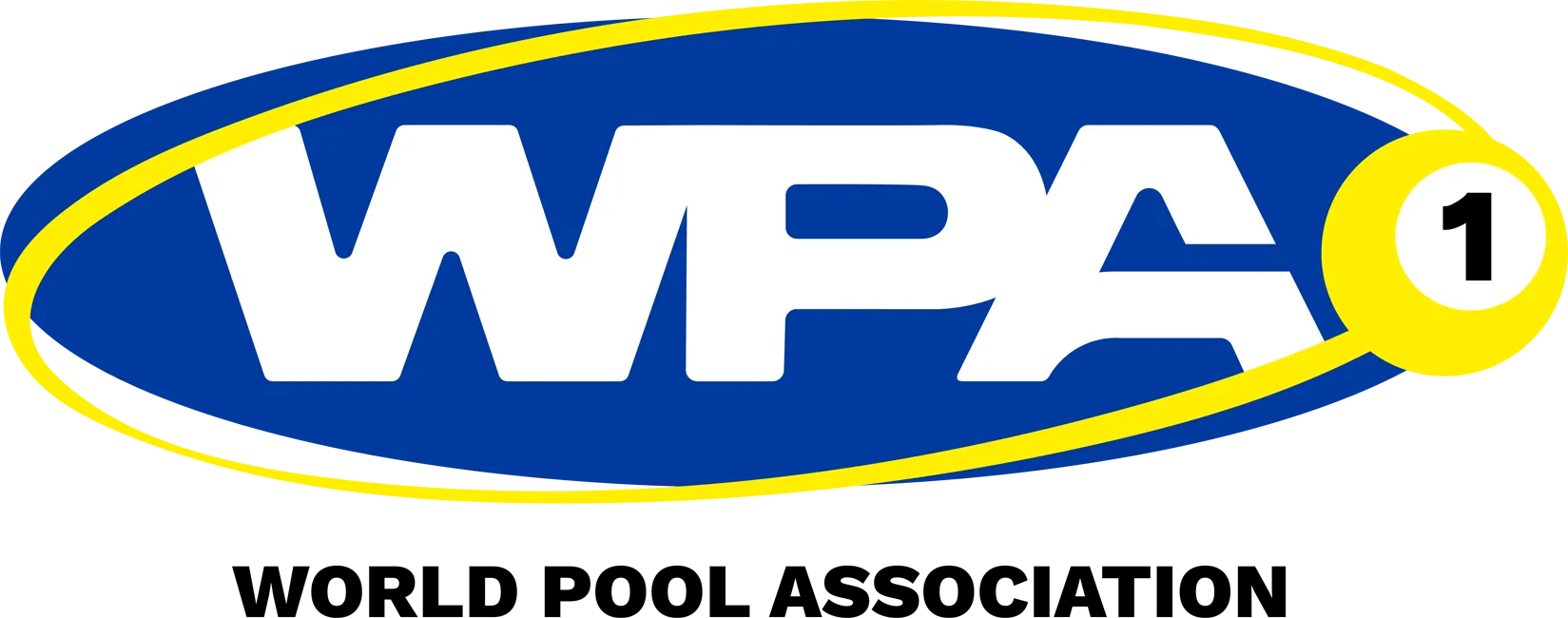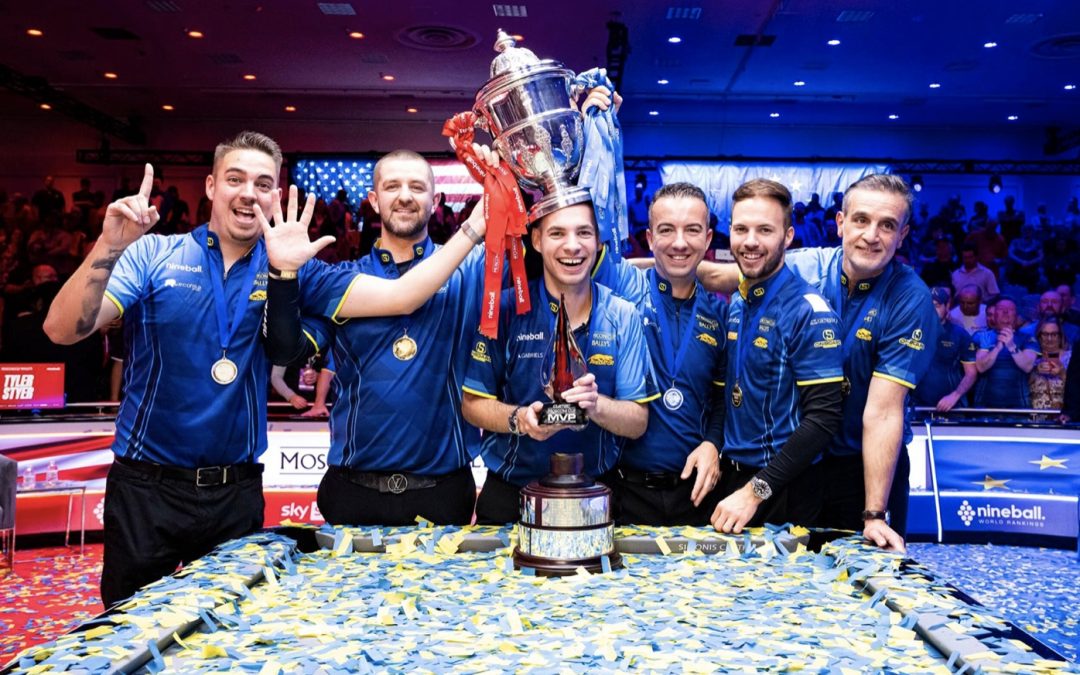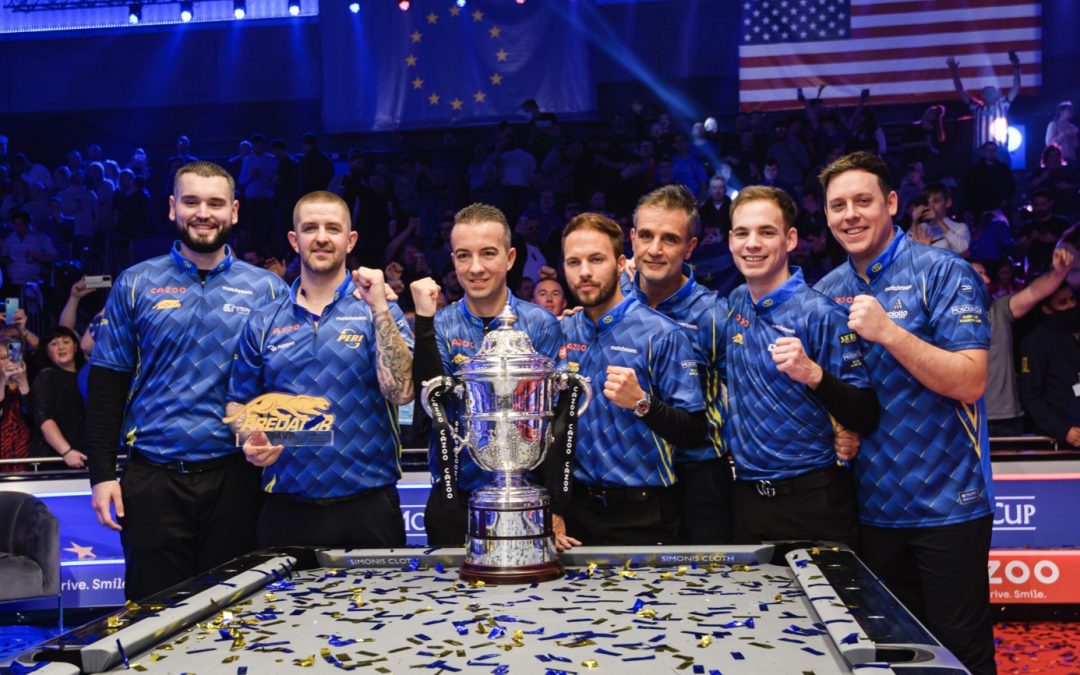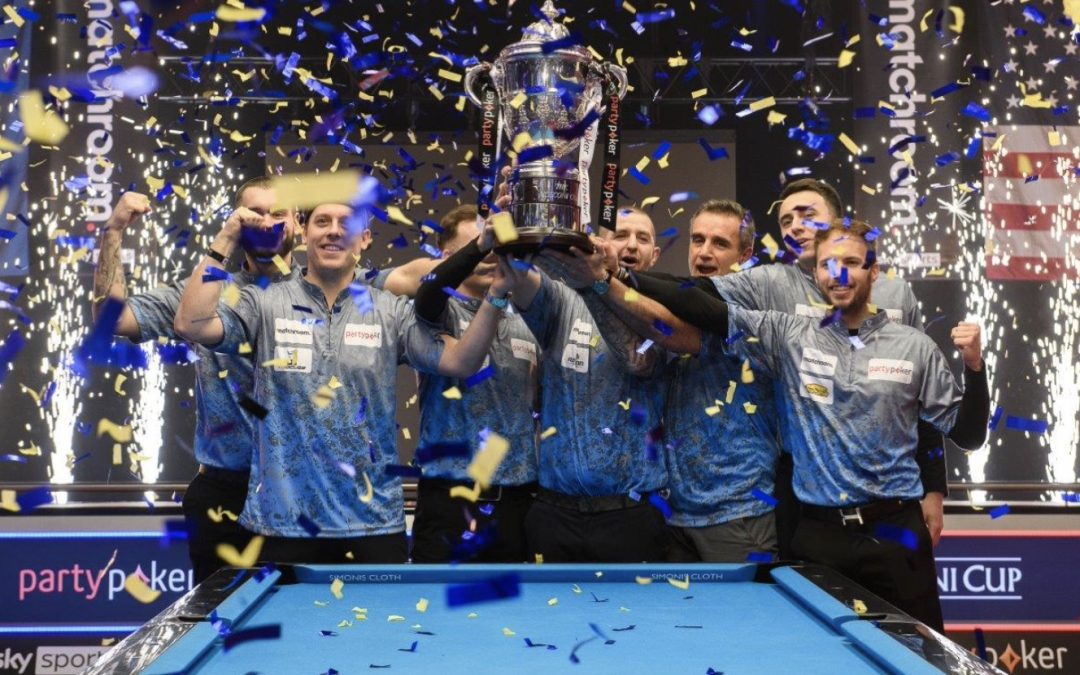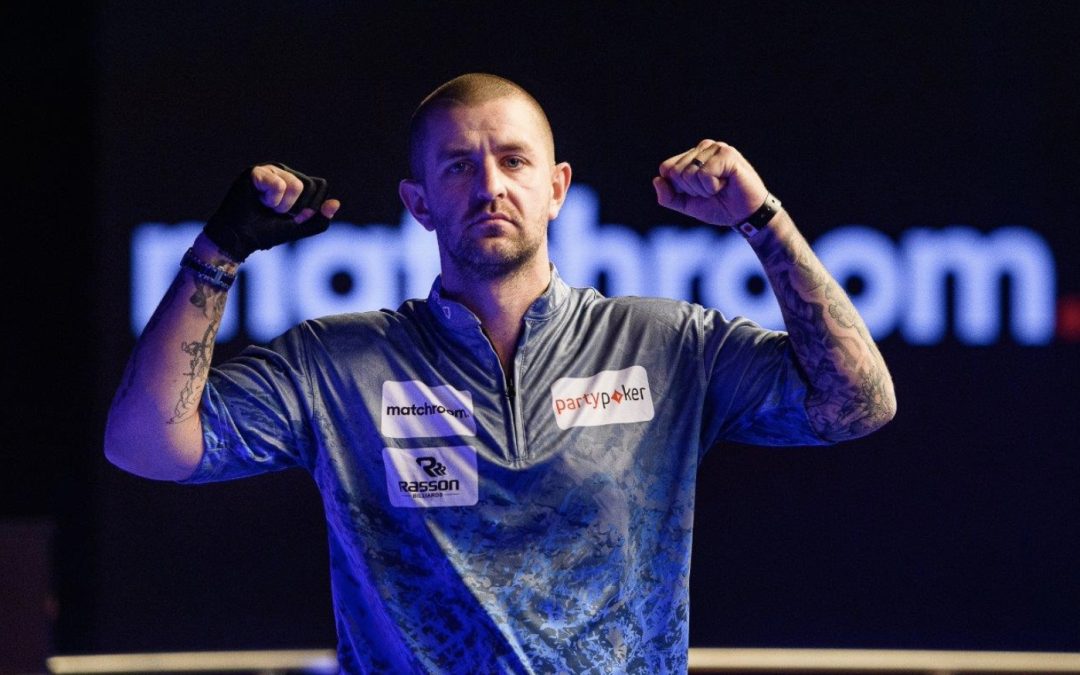Story by Ted Lerner
Photos by Lawrence Lustig-Matchroom Sport
Article courtesy of Billiards Digest
OVER THE course of four bitterly cold days December in a gritty section of East London, the Mosconi Cup returned home. Pool’s annual transatlantic showdown has been one of the sport’s most entertaining tournaments. The 17th version, however, took the team title to a new level. Forget, for a moment, Team Europe’s heart-stopping 11-8 victory over the never-say-die Americans. The actual tournament, arguably one of the most thrilling events in recent history, was one part of a much larger picture, a vision of everything the sport of pool could and should be.
The 2010 Mosconi Cup had just about everything going for it – a venerable, historic venue; technically spectacular live coverage on British TV; raucous and knowledgeable crowds like the sport has never seen, all chanting and singing and blaring horns, cranking up the pressure on every single shot; one incredible comeback after another by 10 of the world’s best players; and, get this, professional pool players crowd-surfing like they were front row at a rock concert.
Indeed, it was that good.
It was a confluence of ingredients, all carefully selected and nurtured by English promoter Barry Hearn and his company, Matchroom Sport. Hearn’s choice to bring the Mosconi Cup back to East London’s York Hall was a masterstroke of promoting intuition and savvy. After seven years of trying to grow the Mosconi brand by taking it on the road to places like Holland, Malta and alternating years in Las Vegas, Hearn wanted the event back in London at York Hall in hard-nosed Bethnal Green, where it was held from 1997 to 2002. The 81-year-old York Hall, which is known mostly for hosting boxing shows, had received a bit of a face-lift in 2004, but its confined design remains intact, as does its palpable granular history. With room for little more than 500 fans and an overhanging balcony that puts patrons nearly over the table, York Hall is the perfect venue for pool.
Matchroom’s idea to sell tickets also proved to be a crafty move. Back in the old days of the Mosconi Cup at the Hall when the event was still struggling to gain traction, tickets were free. This attracted plenty of non-pool fans, beer-bloated blokes and football hooligans who came from the local area just looking for something to do. Sure, they were loud and rowdy, but they didn’t necessarily like pool or know anything about the game; they came because it was an intercontinental sporting event – and an opportunity to give the visiting Americans a hard time.
But in a testament to how the event has grown in popularity in recent years, and also to Europe’s having overtaken the U.S. as a hotbed of champion pool talent, three-quarters of the tickets were snatched up by hard-core pool fans in the first few weeks. By the beginning of the tournament, most sessions were sold out. Matchroom officials originally thought that the crowd this year would perhaps be mellower because they were pool fans. Instead, they turned out to be the exact opposite. They were knowledgeable. They were loud. And they were ready to party.
Another factor which aided perfection for this year’s tussle? The event featured perhaps the most evenly matched teams in the event’s 17 years. Since Team USA won 11 of the first 13 competitions, Europe revealed its rising pool pedigree by taking the 2007 and 2008 titles (after an unceremonious tie in 2006). At the same time, Team USA seemed to lose interest, especially with growing hostilities surrounding the presence of the volatile Earl Strickland. In 2009, though, with Strickland off the team for the first time in 14 years, the Americans excelled in the newly assumed role of underdogs and, led by the irrepressible Dennis Hatch in his first appearance, stormed to an 11-7 victory.
Team USA brought nearly the same squad into York Hall, with tested vet Rodney Morris replacing Oscar Dominguez alongside holdovers Hatch, Johnny Archer, Corey Deuel and Shane Van Boening. Non-playing captain Nick Varner, himself a veteran of four Mosconi Cups at York Hall, knew the crowd would be a virtual sixth man for the Europeans, but insisted it would actually work in his boys’ favor.
“I think my team likes that,” Varner said. “America always seems to have a target on their forehead. Everybody always wants to kick our ass and it makes the guys bear down and concentrate harder.”
The talented Americans would be up against not just a hostile crowd, but perhaps the strongest European squad ever assembled. Captained by Johan Ruijsink of the Netherlands, Team Europe boasted 14-time Mosconi Cuppers Mika Immonen and Ralf Souquet, U.S. Open champ Darren Appleton, Holland’s Nick van den Berg and European No. 1 Karl Boyes, the only rookie in the 2010 competition.
While Team Europe was the betting favorites, by the time emcee John McDonald belted out his opening introductions, the stage had been set for an all-time classic. As the players made their way through the stands and into the arena, the well-refreshed crowd was in a veritable frenzy, its deafening guttural shouts of “Eurr…ope! Eurr…ope!” cascading off the ceiling of old York Hall. You’d be forgiven if you thought you’d stumbled into a Premier League soccer match. But this, incredibly, was pool. At stake was the Mosconi Cup, back in its spiritual home. And the fireworks were just starting.
THE TRADITIONAL five-man, alternate-shot team match that opened the 2010 Mosconi Cup offered the perfect taste of things to come. No lead, no matter how large, would be safe; expect the unexpected; every ball carried the potential for high drama. Europe quickly jumped out to a 2-0 lead in the race-to-6 opener, then took the match to 4-2. Then Team USA started the comeback by winning three straight. Breaking for the match and the tournament’s first point, the Americans were down to three easy balls, when Hatch inexplicably left Morris an 8 ball hooked by the 9. When Morris failed to make contact, the Europeans quickly tied it, then broke and ran the next rack to get on the board first.
Sticking to the plan to stay loose and light, Varner played the heart and emotion cards in the first doubles match, sending out Hatch and Morris to do battle with Van den Berg and Souquet. Hatch seemed to recover nicely from his opening-match gaffe, and he and Morris rolled to a quick 5-0 lead. In the face of the high-octane crowd, the two Americans were having fun, laughing and, at one point, exchanging chest-bumps. Souquet, on the other hand, looked out of sorts. He had injured his back and shoulder in Japan several weeks prior, but wasn’t saying how badly he was hurt. As would happen in nearly every match, the deficit would soon disappear. The European duo clawed back in the match, reducing the lead to 5-4. Only when Van den Berg missed a cross-side bank could the Americans claim their first point.
“I can’t be as emotional as I was in Las Vegas but I’m still not going to sink back into my chair,” Hatch said. “I’m still going to try to get my team riled up.”
Hatch would do his part from the stands, as the mild-mannered Deuel was up next for the Americans in a singles set against Immonen, the last match of the evening. Immonen was eager to make amends for his listless performance in 2009, racing out to a 3-0 lead. Deuel, though, stuck to the American script, keeping his cool and taking care of business. Tied at 4, Deuel slam-dunked the Finn with a lock-down safety to claim his fifth game, before a low-percentage gamble on a 2-9 combination paid off handsomely for the match. The Americans, now up 2-1, celebrated wildly as the crowd fell silent.
The drama continued into Day Two, as three of the four matches went hill-hill. Archer and Van Boening came out to try and extend the Americans’ lead, but they faced the all-English pairing of Appleton and Boyes. With two of their “mates” playing, the packed house sang songs and cheered every pot by their boys and the slightest misstep from the Americans.
The English tandem raced out to a 3-0 lead. The Americans quickly tied up the match, taking advantage of several errors by Boyes. In the stands right behind the table, Hatch couldn’t contain himself, taunting Boyes with catcalls of “weak link!” The Europeans paid the taunt little mind and bore down even harder, taking the match to 5-3. In the nervy 10th frame, Appleton showed his class when he nailed a seemingly impossible full-table bank on the 9 ball to win the match and tie the score at 2-2.
“I’ve been playing really well for the last couple of months,” Appleton said. “Last year I didn’t win a point. But here, the crowd is amazing and a major help.”
The next match was captain’s pick, where each team’s skipper picked the opposing squad’s representative. Interestingly, out came Archer and Souquet, who between them had 28 Mosconi appearances, but who had both been chosen presumably because of shaky performances on Day One. The two legends did not disappoint, however. Archer jumped out to a 4-0. But just when everyone thought Souquet was done, the German stormed back to take the lead, 5-4. But Archer then grabbed the next two racks to put the U.S. back in front.
In the next doubles contest, Appleton teamed up with Souquet to take on Morris and Deuel. The Americans came back from 4-3 down to get on the hill first. With a two-point overall lead in their grasp, Deuel misplayed position on the 6 ball, allowing the Euros to clear. They then broke and ran the final rack to tie the match, 3-3.
Normally rather dour and quietly intense in singles competition, Appleton was playing with a fire that was infectious. The Englishman was so animated after the final 9 ball dropped that he planted a kiss on the cheek of Souquet.
“I’m a lot more passionate in team play,” Appleton said afterward. “It’s not just about me. I’m just trying to get the team pumped up, because yesterday some of the guys struggled.”
The fans came up with their own song for Van den Berg in the final match of the night, but opponent Van Boening put the lid on the pot, for the moment anyway, dropping a 3-9 combo in the case game to give the USA a satisfying 4-3 advantage at the end of the day.
Saturday was another frigid afternoon in East London, but inside York Hall, the sellout crowd was gearing up for what would be one of the most memorable days in Mosconi Cup history. To add to the pressure, the matches were shortened to races to 5, due to time constraints on the live broadcast with Britain’s Sky Sports.
The first match brought out Hatch and Archer to face Immonen and Boyes. Much was being made of Hatch’s heckling of Boyes the day before. In their first showdown, though, it was Hatch who looked weak. Immonen and Boyes crushed the Americans, 5-1, to even the score at 4-4.
“Apparently I’m the weakest link,” a defiant Boyes said, “so if that’s the [case] then I will take that.”
The Americans showed their resiliency, though, as they rebuffed the Europeans’ attempt at the lead. In the second doubles match, Archer and Deuel capitalized on several key mistakes from Immonen and Souquet, winning the match 5-2 and taking back the advantage.
Moments later Boyes came back on the table for a singles match against Morris. The pressure was clearly on Boyes, who was facing Morris in his first appearance in a singles match, with the Americans six racks from a two-point overall advantage. But Morris, down 3-2, missed a makeable 9 ball in the side pocket, and Boyes slammed the door shut, waylaying the “Rocket,” 5-2.
“That’s for Dennis Hatch,” a beaming Boyes said afterward, as the delirious crowd serenaded the young Brit by singing, “Walkin’ in a Boyes Wonderland.” “If he’s about or listening, that’s for you, pal!”
In the evening session, Van Boening and Hatch met Appleton and Van den Berg in another doubles match. The European side looked like they would finally grab the lead in the event, as they raced out to a 4-1 lead. Then Dennis Hatch burst out of his shell.
The previous year in Vegas, Hatch had been the emotional heart of Team USA. But so far in London, he couldn’t seem to find his mojo either with his game or with the crowd. Down 4-3, he potted a brilliant 2-3 combination off a jump shot, then screamed and shouted into the crowd, as the Americans quickly tied the match. In the final rack, a pumped-up Hatch potted a jump on the 4 ball, and Van Boening cleared the final 9 for yet another lead for Team USA at 6-5. Afterward an emotional Hatch admitted he needed such a performance to get going.
“This is the most comfortable I’ve felt here,” Hatch said. “I haven’t felt like myself the last couple of days. I don’t know what it was, the jet lag, [being in a] different country, not sleeping. I’m not making excuses. I’ve been feeling a little anxious, stressed.”
The American lead was short-lived, however, as Souquet and Boyes defeated Morris and Archer in the next doubles match, 5-4. It was Boyes’ fourth point of the tournament and helped tie the event for the sixth time in three days. Something clearly had to give – and in the next match, it did.
Hatch versus Appleton had “marquee” written all over it. Hatch was coming off an emotional doubles victory, while Appleton had established himself as the heart and soul of Team Europe. For the first time in three days, though, Appleton looked out of sorts, as Hatch built up a 4-1 lead. Suddenly, however, the Englishman caught fire and knotted the match in less than a quarter hour. In the final rack, Hatch broke, negotiated some difficult patterns and, with three balls left in a basic spread, seemed to be all clear to the finish line.
“Bring it home!” shouted Varner excitedly from the sidelines.
Incredibly, though, Hatch went long for position on the 8 ball and left himself slightly snookered by the 9. As the York Hall crowd went delirious, Hatch was clearly puzzled by the layout. After calling for a 30-second extension, he tried to masse around the 9 to pot the 8, but the shot went awry. Appleton stepped to the table, took several deep breaths, and converted a full-table shot on the 8 ball. When it dropped, he jumped up and down as the crowd went ballistic. Appleton settled down to pot the 9 to put Europe back in the lead for the first time since the opening match, 7-6. With York Hall being shaken to its octogenarian core, Appleton slammed his cue to the floor, breaking the shaft, and ran into the arms of his delirious teammates.
“I played terribly in the first three or four racks,” Appleton said. “I was a bit too hyped up, but once I got myself together, I felt great. I had a tough shot on the 8 ball in the last rack and managed to make it.
“That’s the most pressure I’ve ever felt in a single shot.”
The positive turn of events and the high drama didn’t end there for the Europeans. There was still one match left in the session, the last doubles contest of the tournament with Van Boening and Deuel facing Immonen and Van den Berg. The Europeans were clearly on fire, and cruised to a 5-1 victory for an 8-6 advantage going into the final day. After that win, with the mob in a late night froth, Immonen and Van den Berg dove into the crowd, who then passed the two players around in what surely was the first crowd surfing ever in a professional pool tournament.
Going into Sunday, there was a slight air of inevitability, as the Americans had left the arena shell-shocked the night before. Indeed, in the first of the all-singles matches to be played (which were returned to races to 6), Immonen drubbed a dispirited Morris, 6-1, to move the Europeans just two points shy of the Cup.
“[Morris] seemed very tense, more tense than usual,” said Immonen. “And I saw some nerves in his face and I used that for my own confidence.”
It was nearing do-or-die for Team USA, a situation that clearly called for some calming experience. Archer provided just that in a barnburner against Boyes. Down 5-1, Boyes stormed back to tie. Archer, though, had won the lag and broke in the final rack, held his nerve and got America back in the contest.
“We aren’t out of this,” Archer said afterward.
“Nick Varner said to us, ‘You are down 9-6 in a race to 11. Have you been in that position?’ So we said ‘Yeah.’
“Then he said, ‘Have you won from that position?’ And we said ‘Yeah!'”
The plot thickened yet again as Hatch raced out to a 4-0 lead against Van den Berg. True to form, though, Van den Berg clawed his way back and reached the hill first. Hatch then broke and ran to tie it at 5. The nervy final rack included a tense safety battle, and another inexplicable position error on the 8 ball for Hatch, which sent the York Hall fans into fits. But Hatch managed to clear and shouted down the stunned crowd.
“That’s what heart is about!” Hatch screamed as he flexed his bulky biceps.
Fortunately for Team Europe, they had Appleton out for the first match against Van Boening. Van Boening had played solid pool throughout the tournament, but Appleton had been on another level all week. And in this match, he took his game to the stratosphere. Backed by one of the loudest pool crowds in history, Appleton played lights-out, shutting the door on his American opponent and cruising to an emphatic 6-2 win that put Team Europe one point from the Cup.
The consummate veteran, Souquet provided the steady and calming demeanor to close the deal for the Europeans in the face of the mounting anticipation from the ravenous crowd. He and Deuel split the first six games before the German broke and ran to grab a lead he wouldn’t relinquish. After Deuel broke dry while trailing, 5-4, Souquet methodically picked off the colors. The York Hall crowd sensed what was coming, and they roared with every ball’s disappearance. They barely bothered to stay silent when Souquet left himself straight on the 9 ball. When that final ball fell, the place exploded with rapturous joy. The Europeans, winners of the 2010 Mosconi Cup, stormed into each other’s arms.
“This is madness!” said Appleton, just moments before accepting the tournament MVP award.
The Americans, as they solemnly watched their opponents celebrate wildly, were left without answers. For two and half days, they held the Europeans at bay, only to be over taken by what seemed to be a tsunami of emotion coming out of the York Hall stands.
“It came down to the break, and they out-broke us by a long shot,” a dejected Archer said. “They didn’t outplay us, but [they] out-broke us.”
For the moment, though, the celebrations belonged to Europe, who made the most of every opportunity. As they celebrated with friends and family in the players room afterwards, someone noticed that one of the American players had scribbled nasty notes about the Europeans on their pictures hanging on the mirror; nobody really cared.
And it’s surely a frustration that will fade, as the Americans reflect and realize they were an integral part of something special, something bigger than a win or a loss. This was an event that brought together the game’s best, in the perfect venue, with a crowd that – at least for an extended weekend – made pool a big-time sport.
“You can’t win the Mosconi Cup without playing like a team, and the lads have been amazing,” Appleton said. “I played really well, but it was very easy to feed off the crowd ” the bigger the crowd, the better I play.
“I knew the crowd would be like the sixth man and it was important to get them involved. … I mean, they were bringing the roof down. I’ve never seen anything like it. This is the best event I’ve ever played. It’s absolutely crazy. I think the Americans, when they look back, will realize how much they enjoyed it.
“The real winner this week is pool.”
